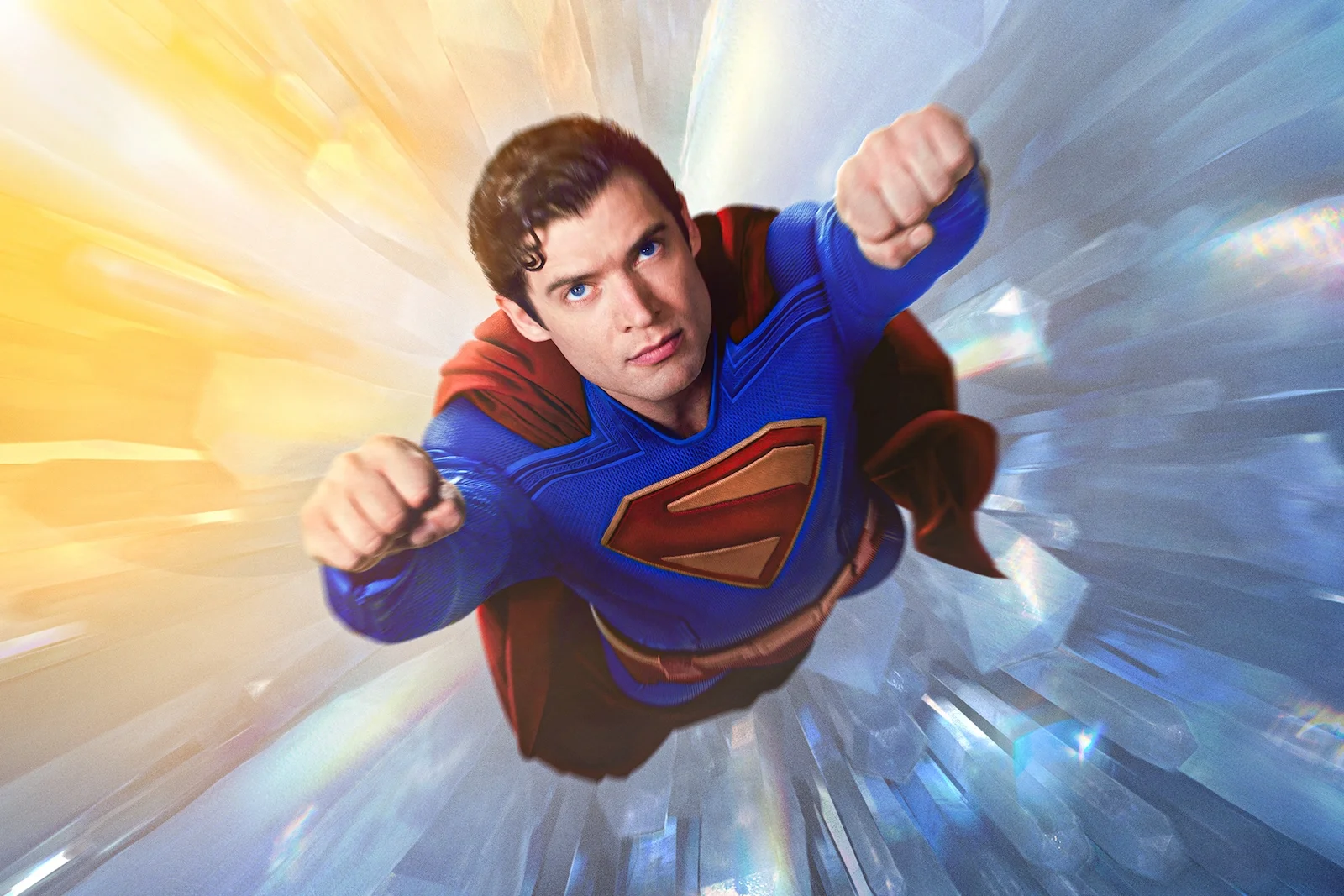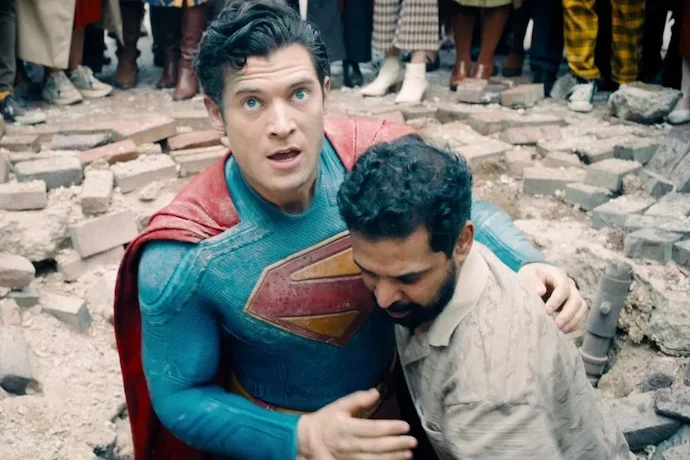
Is James Gunn Quietly Redrawing Hollywood’s Moral Map?
It was a lazy summer day, and I was absentmindedly scrolling through my social media feed. Having just graduated with a Bachelor’s degree and awaiting the arrival of my diploma, I stumbled across something unexpected on Threads. Reports were circulating that the new Superman film had subtly criticized Israel while portraying Palestinians in a favorable light—despite using fictional countries as narrative stand-ins. Curious, I decided to see for myself. After watching the film, I found that the reports were, at least in part, accurate.
The story opens with Superman suffering his first-ever defeat after intervening in a “conflict” between a powerful fictional Eastern European country called Boravia and its weaker, yet resource-rich, Middle Eastern neighbor, Jarhanapur. Superman’s unruly canine sidekick, Krypto the Superdog, comes to his aid and brings him to safety so he can recover. While resting, Superman listens to a transmission from his Kryptonian parents, but is only able to decode the first half. Once restored, he returns to Metropolis to resume his battle against the Hammer of Boravia, a mysterious supervillain with connections to both Lex Luthor and Vasil Ghurkos, the authoritarian president of Boravia, who bears a striking resemblance to David Ben-Gurion, Israel’s founding prime minister.
In his civilian guise as Clark Kent, Superman heads back to work at the Daily Planet. That evening, while cooking breakfast-for-dinner to mark a three-month anniversary with Lois, he agrees—somewhat reluctantly—to be interviewed by her in his Superman persona. During their conversation, Lois presses him on his involvement in the Boravia-Jarhanapur conflict. Superman defends his actions, insisting that innocent lives were at risk.
Meanwhile, Lex Luthor locates Superman’s secret hideaway in Antarctica and deciphers the second half of the Kryptonian message. According to this version, Superman was supposedly sent to Earth to mate with human women and establish a harem to reproduce his species and replace humanity. Seizing the opportunity to destroy Superman’s reputation, Luthor leaks this information to the media. Chaos ensues. A monster attacks Metropolis, prompting Superman to respond—only for the Justice Gang to intervene. Soon after, reports begin to circulate that Superman is building a metahuman population through a secret harem, triggering widespread fear. Superman is ultimately captured and imprisoned in a secret facility located in a pocket universe.
Lois Lane eventually discovers Superman’s whereabouts through Jimmy’s ex-girlfriend—who is now romantically involved with Luthor. She partners with Mr. Terrific to orchestrate Superman’s release, and together they succeed. Confronting Lex Luthor, the truth finally comes to light: Luthor has been secretly selling weapons to Boravia, which enjoys strong support from the United States, in exchange for control over Eastern Jarhanapur. His goal is to transform the area into a glittering techno-utopia after its indigenous population is eradicated. This scheme results in a black hole that nearly consumes the planet, but Superman manages to close the rift just in time while the Justice Gang pushes back against Boravia’s second invasion. The film concludes with Superman and Lois Lane reaffirming their relationship, and with Luthor and Ghurkos facing justice.
Even for those not particularly invested in the region’s geopolitics, the symbolism is unmistakable: Boravia and Jarhanapur are clear allegories for Israel and Palestine, regardless of how strongly the director insists on the story’s fictional nature. The dictator of Boravia bears an uncanny resemblance to Ben-Gurion. Boravia is situated in Eastern Europe, mirroring the ancestral roots of many Israeli leaders, while Jarhanapur, located in the Middle East, is home to dark-haired, olive-skinned citizens—visually evoking Palestinians. Luthor’s arms deals and his plans to develop Eastern Jarhanapur into a techno-hub closely resemble proposals floated by Donald Trump, Benjamin Netanyahu, and Elon Musk regarding Gaza.

The U.S. government’s unwavering support for Boravia also reflects the real-world dynamic between Washington and Tel Aviv. Moreover, the false claim about Superman’s mission to replace humanity echoes the dangerous and debunked “great replacement” theory—a conspiracy that has inspired numerous terrorist attacks both in the U.S. and abroad. The film further reveals that Luthor commands a network of Internet trolls who manipulate public perception of Superman through mass-produced disinformation—a tactic I’m intimately familiar with, having once been involved in online astroturfing campaigns. Luthor and Ghurkos’s accusations about Superman’s supposed harem and his alleged obsession with Boravian women play on long-standing Orientalist stereotypes of Arab Muslim men as predatory and hypersexualized. This is especially striking when compared to earlier portrayals of Islam in Western media, which often leaned heavily into caricature and vilification.
Ghurkos also routinely brands any form of resistance to his regime—whether armed or peaceful—as terrorism, reflecting Israel’s policy of categorizing all Palestinian resistance in the same terms.
Yet the film is not without its own problematic elements. Critics have pointed out that the Justice Gang’s intervention leans into the “white savior” trope, which undermines and infantilizes marginalized communities—a trope most infamously embodied by Daenerys Targaryen in Game of Thrones, particularly in the Slaver’s Bay arc, which was steeped in Orientalist fantasy. Adding to the discomfort is the portrayal of Malik, a South Asian falafel vendor who aids Superman during his recovery, only to be killed by Lex Luthor. His death reinforces the damaging stereotype that Middle Eastern, North African, and South Asian characters exist merely as disposable tools in the hero’s narrative. Jarhanapur’s residents are depicted as helpless victims of Boravian military aggression, dependent on Western heroes for salvation—a trope as old as Hollywood itself.
Still, despite these shortcomings, James Gunn’s Superman may mark a turning point. For over a century, Hollywood has routinely typecast Muslims as terrorists, oil sheikhs, informants, or submissive women hidden behind veils—or else exoticized them as belly dancers—without serious backlash. The release of Superman, along with Amazon Prime’s #1 animated sitcom Happy Family USA (about an Egyptian family navigating post-9/11 America), and shows like Mo and Ramy, suggests that the industry is finally beginning to reckon with decades of criticism from Muslim creators and audiences alike.
Of course, this moment demands more than symbolic gestures. Hollywood must be held accountable for the countless films that have vilified Islam and its followers. It must also confront newer patterns, like those seen in Adolescence on Netflix, which echoes post-9/11 tropes in its portrayal of autistic white men—again reducing a marginalized group to one-dimensional representations.
Will James Gunn’s Superman usher in lasting change? It’s too early to say. But for now, it’s a welcome development—and perhaps the first true sign that Hollywood is listening.
